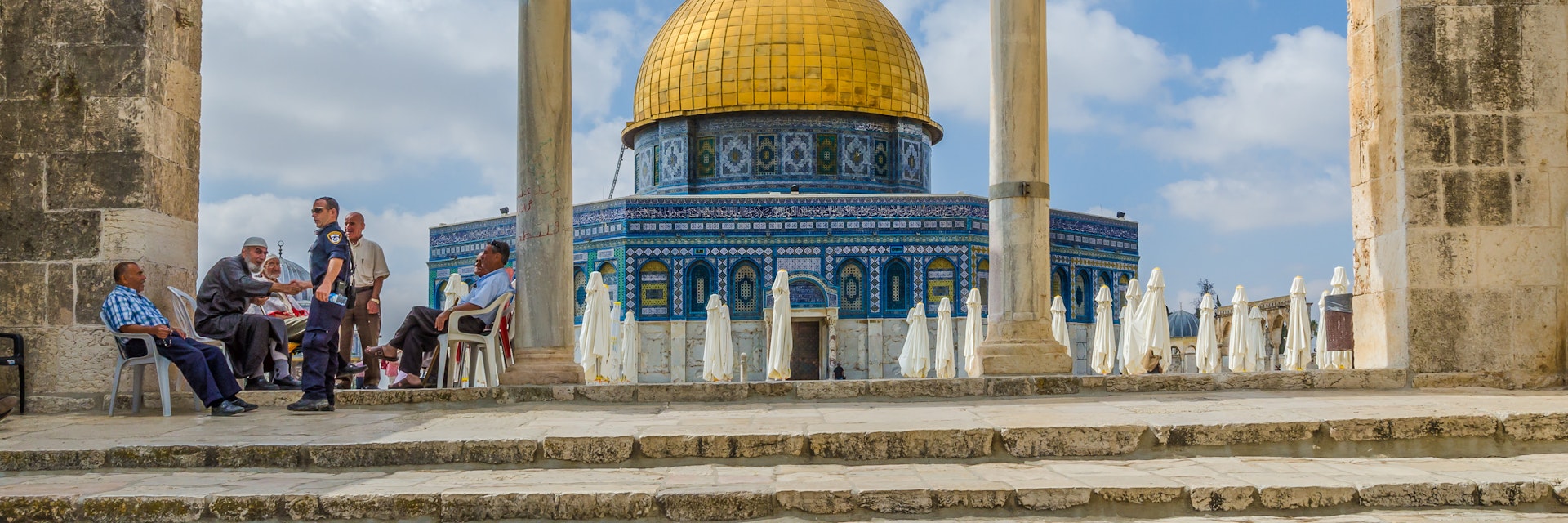
©Beata Bar/Shutterstock
Few places on earth stir up passion the way that Israel does: the breathtaking beauty of its hills and valleys, the eerie stillness of the Dead Sea, the multi-colored canyon of Makhtesh Ramon, and the ancient walls and pathways of Nazareth and Jerusalem. The call of the muezzin and the quiet prayers of Orthodox Jews at the Western Wall reflect how the religious devotion of the Muslims, Christians and Jews who live here runs through every facet of life.

Attractions
Must-see attractions.
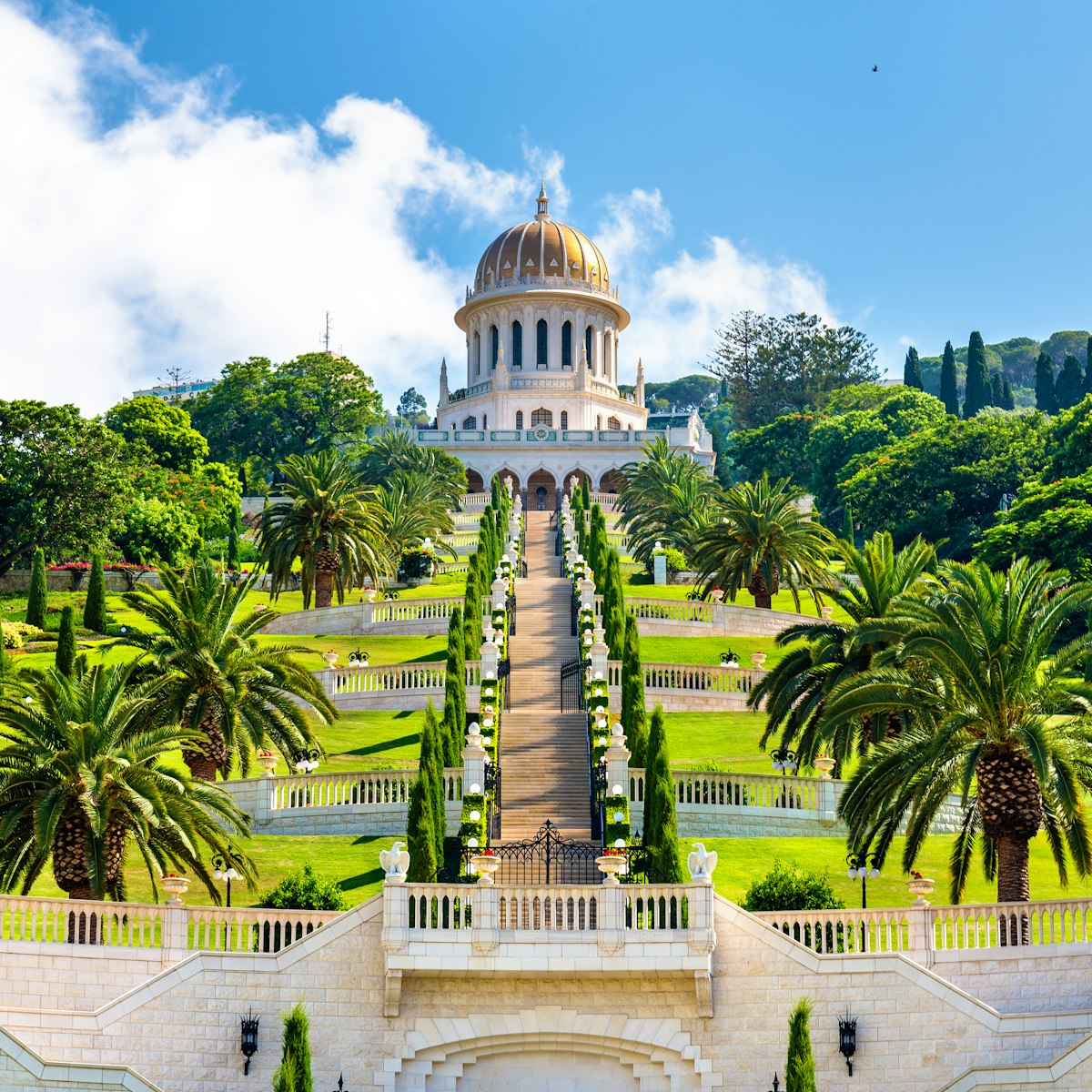
Baha’i Gardens
These formal gardens flowing down 19 steep terraces to a resplendent domed shrine – the final resting place of the prophet-herald of the Baha’i faith –…
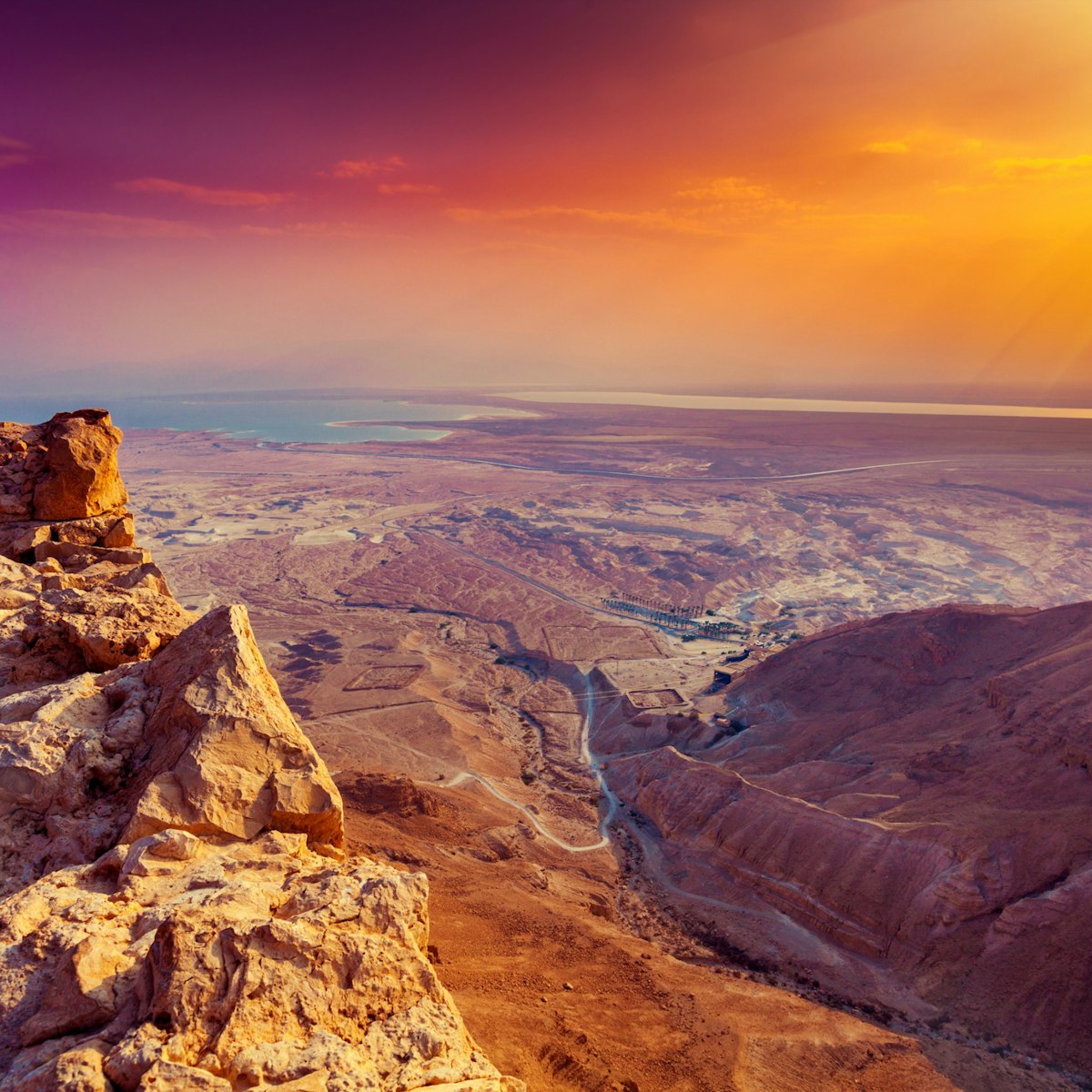
Masada National Park
The plateau atop Masada, which measures about 550m by 270m, is some 60m above sea level – that is, about 490m above the surface of the Dead Sea. The…

Basilica of the Annunciation
Dominating the Old City’s skyline is the lantern-topped cupola of this Franciscan-run Roman Catholic basilica, an audacious modernist structure that’s…
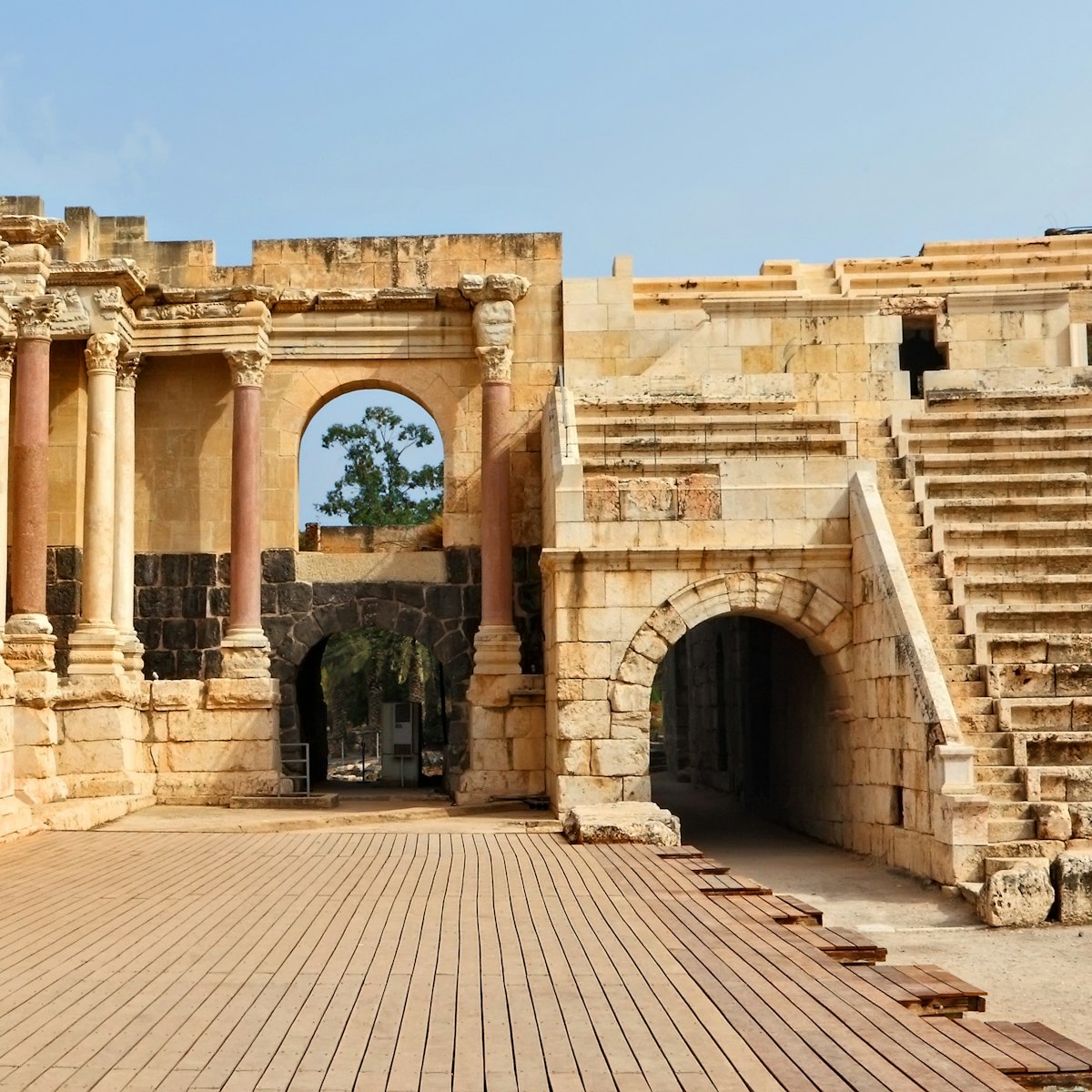
Beit She’an National Park
Lower Galilee
Beit She’an’s extraordinary Roman ruins are the best place in Israel to get a sense of what it was like to live, work and shop in the Roman Empire…
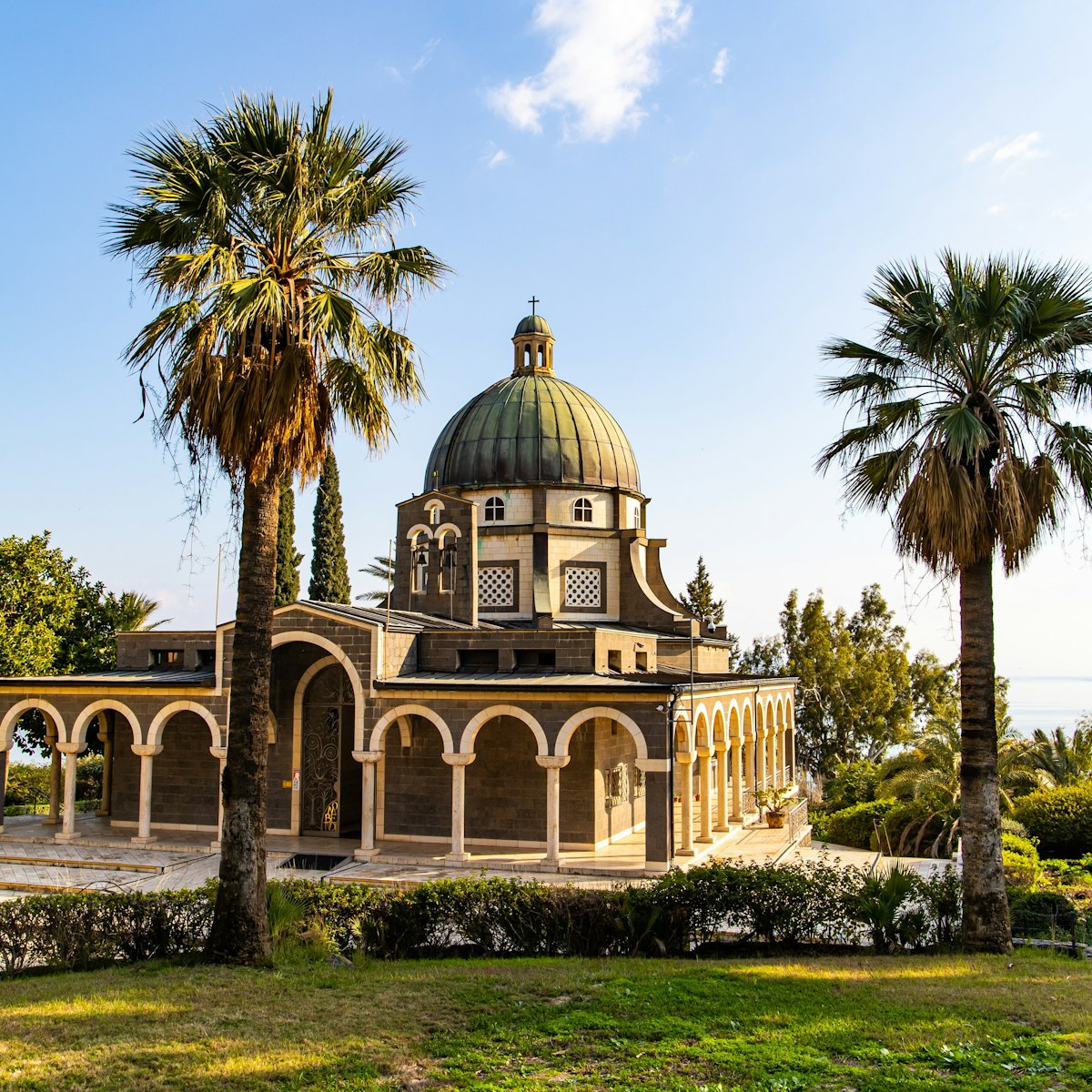
Mount of the Beatitudes
Sea of Galilee
Since at least the 4th century, this landscaped hillside is believed to be where Jesus delivered his Sermon on the Mount (Matthew 5–7), whose opening…
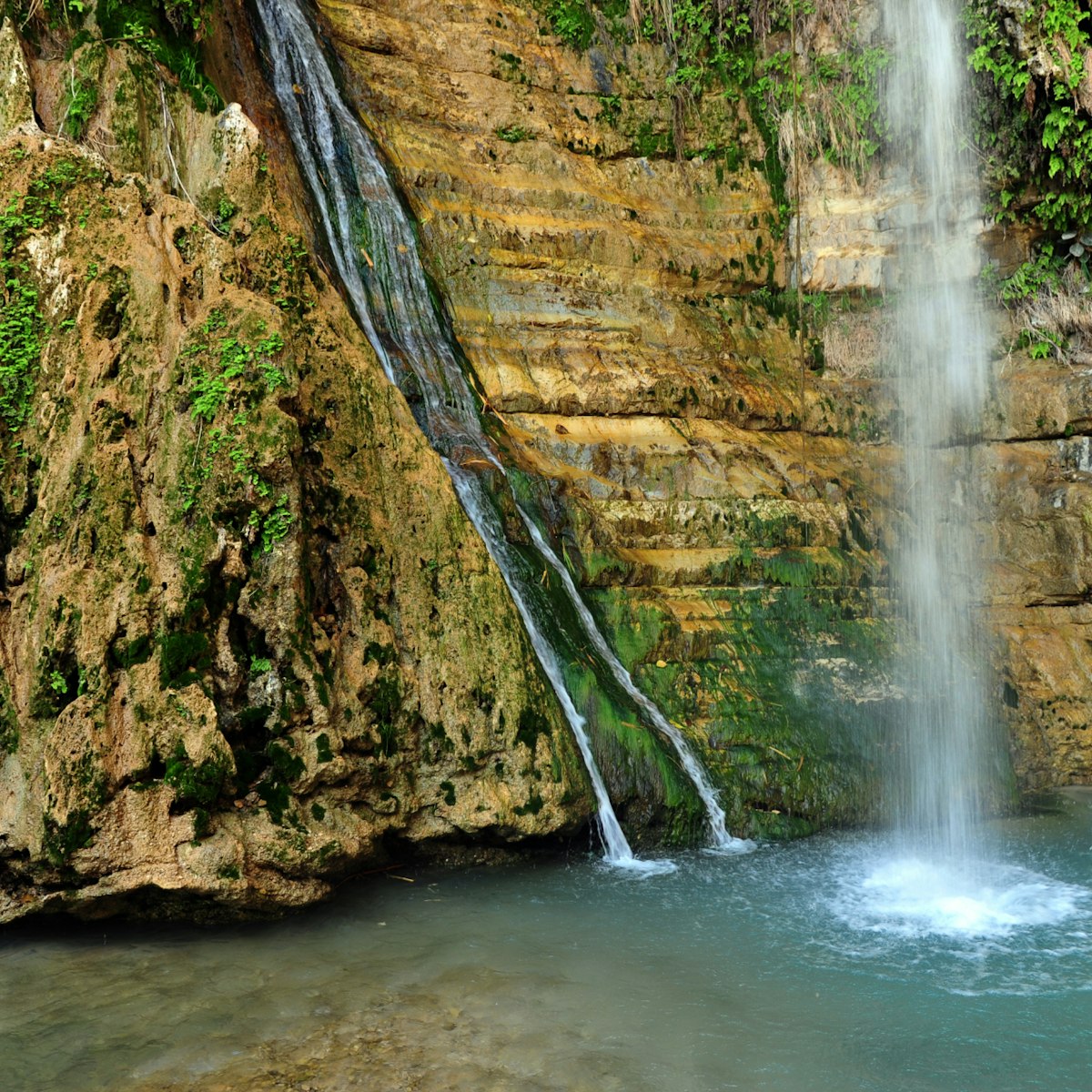
Ein Gedi Nature Reserve
This reserve consists of two roughly parallel canyons, Wadi David and Wadi Arugot, each of which has its own entrance complex and ticket office. It is…
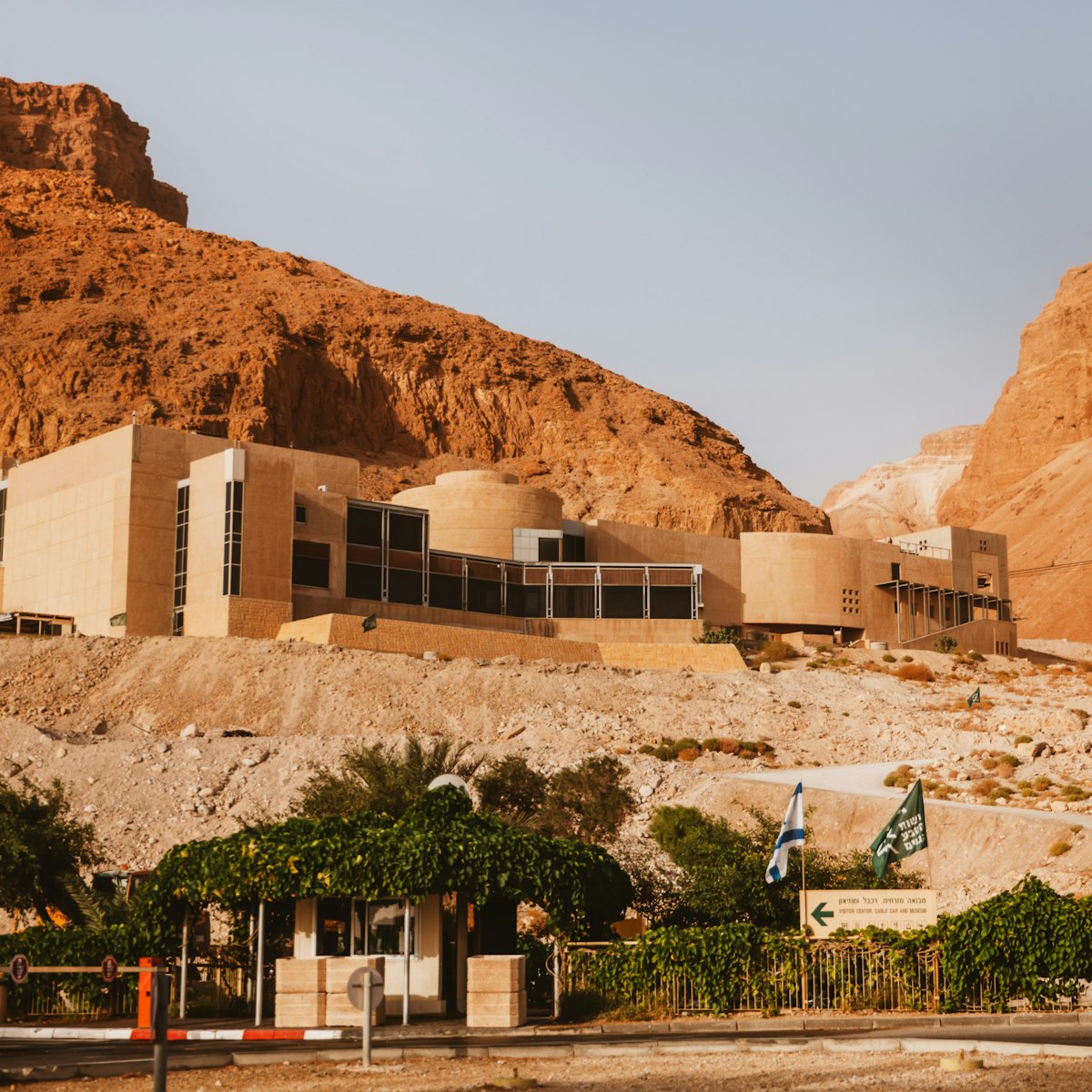
Masada Museum
An outstanding and remarkably vivid introduction to Masada’s archaeology and history, this museum combines 500 evocative artefacts unearthed by…

Hai-Bar Yotvata Nature Reserve
Established in 1968 to reintroduce animals that had died out in Israel, this 32-sq-km reserve on the Yotvata salt flats is home to a wide variety of…
Latest stories from Israel
Filter by interest:
- All Interests
- Adventure Travel
- Art & Culture
- Beaches, Coasts & Islands
- Food & Drink

Apr 14, 2021 • 2 min read
A limited number of groups can enter from 23 May and the number will be increased based on the health situation
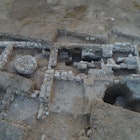
Aug 25, 2020 • 2 min read

Nov 24, 2019 • 6 min read
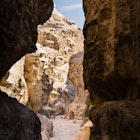
Nov 6, 2019 • 5 min read

May 13, 2019 • 5 min read

Apr 17, 2019 • 5 min read

Dec 13, 2018 • 5 min read

Dec 8, 2018 • 7 min read
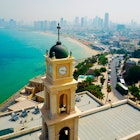
Dec 3, 2018 • 3 min read

Oct 1, 2018 • 5 min read
in partnership with getyourguide
Book popular activities in Israel
Purchase our award-winning guidebooks.
Get to the heart of Israel with one of our in-depth, award-winning guidebooks, covering maps, itineraries, and expert guidance.
Israel and beyond
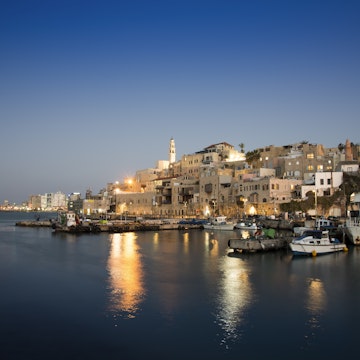
Update April 12, 2024
Information for u.s. citizens in the middle east.
- Travel Advisories |
- Contact Us |
- MyTravelGov |
Find U.S. Embassies & Consulates
Travel.state.gov, congressional liaison, special issuance agency, u.s. passports, international travel, intercountry adoption, international parental child abduction, records and authentications, popular links, travel advisories, mytravelgov, stay connected, legal resources, legal information, info for u.s. law enforcement, replace or certify documents.
Before You Go
Learn About Your Destination
While Abroad
Emergencies
Share this page:
Israel, The West Bank and Gaza
Travel Advisory April 11, 2024
See individual summaries.
Updated with information on travel restrictions for U.S. government employees under Chief of Mission security responsibility.
Do Not Travel To :
- Gaza due to terrorism and armed conflict
Reconsider Travel To :
- Israel due to terrorism and civil unrest
- West Bank due to terrorism and civil unrest
Country Summary: Terrorist groups, lone-actor terrorists and other violent extremists continue plotting possible attacks in Israel, the West Bank, and Gaza. Terrorists and violent extremists may attack with little or no warning, targeting tourist locations, transportation hubs, markets/shopping malls, and local government facilities. Violence can occur in Israel, the West Bank, and Gaza without warning.
Some areas have increased risk. Read the country information page for additional information on travel to Israel and the West Bank, and Gaza.
Visit the CDC page for the latest Travel Health Information related to your travel.
If you decide to travel to Israel, the West Bank, and Gaza.
- Visit our website for Travel to High-Risk Areas .
- Check the most recent Alerts at the Embassy website for the latest information on travel in all of these areas.
- Maintain a high degree of situational awareness and exercise caution at all times, especially at checkpoints and other areas with a significant presence of security forces.
- Avoid demonstrations and crowds.
- Follow the instructions of security and emergency response officials.
- Beware of and report suspicious activities, including unattended items, to local police.
- Learn the location of the nearest bomb shelter or other hardened shelter. Download the Home Front Command Red Alert application for mobile devices (available on devices within Israel) to receive real time alerts for rocket attacks.
- Obtain comprehensive travel medical insurance that includes medical evacuation prior to travel. Most travel insurance packages do not cover mental health related illnesses/care.
- Enroll in the Smart Traveler Enrollment Program (STEP) to receive Alerts and make it easier to locate you in an emergency.
- Follow the Department of State on Facebook and Twitter .
- Review the Country Security Report for Israel, the West Bank, and Gaza.
- Prepare a contingency plan for emergency situations. Review the Traveler’s Checklist .
Gaza – Do Not Travel
Do not travel due to terrorism and armed conflict .
The U.S. government is unable to provide routine or emergency consular services to U.S. citizens in Gaza as U.S. government employees are prohibited from traveling there. The Israel Defense Forces (IDF) are conducting large-scale military operations in Gaza against Hamas, a U.S. government-designated foreign terrorist organization, which was responsible for the October 7 attack on Israel. As a result of the armed conflict, the security environment within Gaza and on its borders is extremely dangerous and volatile. The pedestrian crossing between Gaza and Israel was damaged on October 7 and remains closed, and the pedestrian crossing between Egypt and Gaza may close without advance notice depending on the security situation. There are sporadic telecommunication and internet outages within Gaza further inhibiting the ability of residents to obtain information.
Visit our website for Travel to High Risk Areas .
If you decide to travel to Gaza:
- Be prepared for an indefinite stay as the crossings between Gaza with Israel and Egypt can close without advance notice and for long periods during times of unrest and armed conflict.
- Have a plan for entering and departing Gaza that does not rely on U.S. government assistance.
- Households with infants and young children should plan for food and supplies, such as diapers and wipes, formula or baby food, and a change of clothing.
- If you take medication, make sure to have at least five days’ worth at any given time – if you can, we encourage enough for two weeks beyond your scheduled trip and have a copy of your prescriptions handy.
- If you use assistive or medical devices that require a power supply, be sure to find backup power or other ways that will sustain your device or equipment during a power outage.
- Draft a will and designate appropriate insurance beneficiaries and/or power of attorney.
- Discuss a plan with loved ones regarding care/custody of children, pets, property, belongings, non-liquid assets (collections, artwork, etc.), funeral wishes, etc.
- Leave DNA samples with your medical provider in case it is necessary for your family to access them.
Please be sure to visit our website for How to Prepare for a Crisis for information that may be helpful.
Israel – Reconsider Travel
Reconsider travel due to terrorism and civil unrest .
The security situation remains unpredictable, and U.S. citizens are reminded to remain vigilant and take appropriate steps to increase their security awareness as security incidents, including mortar and rocket fire, often take place without warning.
U.S. government employees in Israel under Chief of Mission security responsibility are currently restricted from personal travel to the following locations:
- Within seven miles of the Gaza demarcation line, as well as the cities of Ashdod and Ashkelon;
- Within 2.5 miles of the Lebanese and Syrian borders; and
- Within 1.5 miles of the Israel-Egypt border.
Additional travel restrictions may be imposed on U.S. government employees under Chief of Mission security responsibility, with little to no notice due to increased security issues or threats.
West Bank – Reconsider Travel
U.S. government employees in Israel under Chief of Mission security responsibility are currently restricted from all personal travel to the West Bank, except:
- U.S. government employees can use Routes 1, 90, and 443 at any time.
- U.S. government employees are permitted personal travel to Jericho.
- U.S. government employees are permitted daylight travel to: Inn of the Good Samaritan, An-Nabi Musa, Wadi Qelt Nature Preserve, and St. George’s Monastery along Route 1; and Qumran, Kalia Beach, St. Gerasimos/Khogla Monastery, Al Auju, and Qasr al-Yaud baptismal site along Route 90.
Over the past few months, there has been an increase in settler violence, Israeli military operations, and terrorist attacks.
Additional travel restrictions may be imposed on U.S. government employees under Chief of Mission security responsibility with little to no notice due to increased security issues or threats.
Visit our website for Travel to High Risk Areas .
Embassy Messages
View Alerts and Messages Archive
Quick Facts
No minimum requirement, but your authorized stay will not exceed the validity remaining on your passport and airlines may decline boarding if a traveler has fewer than six months validity on his or her passport.
1 page (although passports are normally not stamped upon entry).
Not required for stays of 90 days or fewer. Please see below for detailed information about entry, exit and visa requirements.
You must declare if you are carrying 50,000 shekels or more when entering or exiting Israel by air and 12,000 shekels if entering or exiting by land.
Embassies and Consulates
U.S. Embassy Jerusalem 14 David Flusser Street Jerusalem 93392 Telephone: + (972) (2) 630-4000 Emergency After-Hours Telephone : + (972) (2) 622-7230 Email: [email protected]
Contact the Consular Section of the U.S. Embassy in Jerusalem for information and assistance in Jerusalem, the West Bank, Gaza (including the Erez Crossing), and the Allenby/King Hussein Bridge border crossing between Jordan and the West Bank.
U.S. Office of Palestinian Affairs 18 Agron Road Jerusalem 9419003 Telephone: + (972) (2) 630-4000 Emergency After-Hours Telephone : + (972) (2) 622-7230 Email: [email protected]
U.S. Embassy Jerusalem Branch Office Tel Aviv 71 HaYarkon Street Tel Aviv Israel 63903 Telephone: + (972) (3) 519-7575 Emergency After-Hours Telephone: + (972) (3) 519-7551 Email: [email protected]
Contact the Consular Section of the U.S. Embassy Branch Office in Tel Aviv for information and assistance in Israel outside of Jerusalem, and the northern (Sheikh Hussein) and southern (Yitzhak Rabin) border crossings connecting Israel and Jordan, and the border crossings between Israel and Egypt.
Destination Description
Learn about the U.S. relationship to countries around the world. Please read the Israel, West Bank, and Gaza Travel Advisory for additional information.
Entry, Exit and Visa Requirements
The Government of Israel administers immigration and security controls at its international land crossings with Jordan (into both the West Bank and Israel), Egypt (at the Taba crossing near Eilat), and at Israel’s airports and seaports. A separate network of security checkpoints and crossings operated by Israeli authorities regulates the movement of people and goods between Israel and the West Bank, and between Israel and Gaza.
The U.S. government seeks equal treatment and freedom of travel for all U.S. citizens regardless of national origin, religion, or ethnicity . All persons seeking to enter or depart Israel, the West Bank, or Gaza are subject to immigration and security screening , possibly including prolonged questioning and physical searches, and may be denied entry or exit consistent with the uniform application of Israeli law. Persons who are denied entry have the right to an immigration court hearing to contest the denial, but they will be detained for the duration of the proceedings. Specific questions about your individual circumstances should be directed to your closest Israeli Embassy or Consulate.
When traveling into Israel, please make sure you have proper travel documentation – including a full validity U.S. passport – before arrival in Israel. Israel may deny entry to an individual using a limited-validity, or emergency U.S. passport.
1. Do I need a visa to enter Israel if I normally live in the United States?
U.S. citizens may use their U.S. passport to enter Israel for business or tourism purposes for stays of up to 90 days without a visa, including U.S. citizens transiting Israel to and from the West Bank. For more information, please contact your nearest Israeli Embassy or consulate and consult this webpage: Entry-Exit into Israel .
2. Do I need a visa to enter the West Bank if I am visiting the West Bank and normally live in the United States?
U.S. citizens who are not West Bank residents can use their U.S. passport to enter the West Bank for business or tourism purposes for stays of up to 90 days without a visa. For more information, visit the Government of Israel’s webpage: Entry-Exit Information: Israel, the West Bank and Gaza.
U.S. citizens who are not PA ID/passport holders and who wish to study, teach, research, work, or volunteer in the West Bank should consult the Government of Israel’s Coordinator of Government Activities in the Territories (COGAT) regulations on entry into the West Bank. U.S. citizens who are engaged or are married to West Bank residents and wish to remain in the West Bank should also consult these regulations. Questions regarding these regulations can be directed to COGAT by email at [email protected] or by phone at +972-3-697-7577.
3. Do I need a visa to enter Israel if I normally live in the West Bank?
U.S. citizens who are also residents of the West Bank can either apply for a permit to enter Israel from the Government of Israel’s COGAT or apply for a visa to enter Israel at Allenby Bridge in order to transit through the West Bank to Israel for up to 90 days. For more information, visit the Government of Israel’s webpage: Entry-Exit Information: Israel, the West Bank and Gaza.
4. Do I need a visa to enter Gaza through Israel if I normally live in the United States?
Please see the Travel Advisory before traveling to Gaza. Gaza is Level 4 – Do Not Travel. We remind all U.S. citizens seeking to travel to Gaza that the U.S. government is unable to provide routine or emergency services to U.S. citizens in Gaza. U.S. citizens seeking entry into Israel from Gaza (or entry into Gaza from Israel) should follow the instructions provided on the COGAT website to request permission to enter. For more information, visit the Government of Israel’s webpage: Entry-Exit Information: Israel, the West Bank and Gaza.
5. Can U.S. citizens registered as residents of Gaza enter or transit Israel?
A U.S. citizen who is also listed on the Palestinian Population registry for Gaza and has a center of life in the Gaza – someone who has spent more than 50 percent of the last five years in Gaza (or more than 912 days) as confirmed by the Israeli government – can apply while they are in Gaza for a permit to enter Israel via the Erez Crossing from the Government of Israel’s COGAT. When outside of Gaza, they may apply for admission to enter Israel through any international port of entry.
A U.S. citizen who is also listed on the Palestinian Population registry for Gaza and has a center of life outside the Gaza Strip – someone who has spent more than 50 percent of the last five years outside of Gaza (or more than 912 days) as confirmed by the Israeli government – may use their U.S. passport to enter Israel for business or tourism purposes for stays of up to 90 days without a visa, including transiting Israel to and from the West Bank. Such U.S. citizens cannot enter on their U.S. passport for the purpose of transiting Israel to Gaza.
For more information, visit the Government of Israel’s webpage: Entry-Exit Information: Israel, the West Bank and Gaza.
6. What if I am denied entry?
U.S. citizens should immediately report any denial of entry or harassment or discriminatory treatment by border officials to the American Citizens Services (ACS) unit of the U.S. Embassy in Jerusalem or the Embassy Branch Office in Tel Aviv.
- U.S. citizens can use the U.S. Embassy Jerusalem and Branch Office Tel Aviv online reporting form .
- U.S. citizens can call the Embassy at the phone numbers on our website (denials of entry only): U.S. Citizen Services - U.S. Embassy in Israel (usembassy.gov)
Please note that the decision to admit or deny a traveler admission to Israel is entirely made by the State of Israel, and the U.S. Embassy cannot intervene on an individual’s behalf. U.S. citizens who are denied entry into Israel or the West Bank should receive a written explanation from Israeli authorities.
The Israeli Ministry of Interior has continued to deny entry into Israel and the West Bank of some foreign nationals (including U.S. citizens) affiliated with certain political and non-governmental organizations that the Government of Israel views as anti-Israel. Participation in Boycott, Divestment, and Sanctions (BDS)-related activities is one of the considerations Israeli authorities consider when deciding whether to refuse entry to individuals into Israel and the West Bank.
In addition to contacting the U.S. Embassy, if you were the subject of mistreatment or harassment by Israeli authorities upon entry to or at exit from Israel, you may also email [email protected] to file a complaint with the Israeli authorities. If the mistreatment or harassment occurred at a check point to the West Bank you may email [email protected] to file a complaint.
7. What if I’m an Israeli citizen?
Individuals with Israeli citizenship, regardless of other nationality, including U.S. citizenship, must enter and depart Israel using their Israeli passports in accordance with Israeli law. Due to a passport backlog, Israeli citizens are temporarily allowed to enter and depart Israel on non-Israeli passports until December 31, 2023. Israeli citizens are prohibited from using the Allenby/King Hussein Bridge crossing. They are also prohibited from entering Gaza and are generally prohibited from traveling to parts of the West Bank under PA control (Area A), to include Bethlehem and Jericho.
Further information on dual nationality , prevention of international child abduction, and customs regulations can be found on our website at travel.state.gov.
Safety and Security
Terrorism: Please view the current Travel Advisory for Israel, the West Bank, and Gaza for detailed information regarding the terrorism threat in Israel, the West Bank, and Gaza. For more information, see our Terrorism page.
Jerusalem: See the Travel Advisory for Israel, the West Bank, and Gaza for additional information.
The West Bank: See the Travel Advisory for Israel, the West Bank, and Gaza for additional information.
The Gaza Strip: See the Travel Advisory for Israel, the West Bank, and Gaza for additional information.
Mortar and Rocket Fire: In the event of mortar or rocket fire, a “red alert” siren may be activated. Treat all such alerts as real. Follow the instructions from local authorities and seek shelter immediately. Know the location of your closest shelter or protected space. U.S. government personnel and their family members may be restricted from traveling to areas affected by rocket activity, sirens, and/or the opening of bomb shelters. For additional information on appropriate action to take upon hearing a siren or explosion, see the Israel Defense Forces Home Front Command website (available on devices within Israel) or view the Preparedness Information. U.S. citizens may also wish to download the free Israel Defense Forces Home Front Command application on Android or Apple devices to receive real-time security and safety alerts. Free commercial applications, such as Red Alert: Israel, are also available.
Crime: The crime rate is moderate in Israel, the West Bank, and Gaza. Parked vehicle break-ins are common at public beach areas, national parks, and other tourist sites. Vehicle theft also remains a problem. U.S. citizens should not leave their valuables (including passports) unattended in parked vehicles, on the beach, or unsecured in hotels. Visitors should be aware of their surroundings in tourist areas and watch for crimes of opportunity, such as pickpockets.
For additional information, read the most recent Overseas Security Advisory Council (OSAC) Crime and Safety Report for Israel .
Demonstrations occur frequently. They may take place in response to political or economic issues, on politically significant holidays, and during international events.
- Even demonstrations intended to be peaceful can turn confrontational and possibly become violent.
- Avoid areas around protests and demonstrations.
- Check local media for updates and traffic advisories.
International Financial Scams: See the Department of State and the FBI pages for information.
Victims of Crime: Report crimes to the local police. The local equivalent to the “911” emergency line in Israel and the West Bank is 100 for police, 101 for an ambulance, and 102 for the fire department.
U.S. citizen victims of sexual assault are encouraged to contact the U.S. Embassy for assistance. You can reach the U.S. Embassy at the contact information provided above. Local authorities are responsible for investigating and prosecuting crime.
See our webpage on help for U.S. victims of crime overseas .
- Help you find appropriate medical care
- Assist you in reporting a crime to the police
- Contact relatives or friends with your written consent
- Provide general information regarding the victim’s role during the local investigation and following its conclusion
- Provide a list of local attorneys
- Provide our information on victim’s compensation programs in the United States
- Israel National Police
- Ministry of Justice
- Ministry of Public Security
- Provide information on Government of Israel assistance to victims of terrorist acts (contact the National Insurance Institute for more information)
- Provide an emergency loan for repatriation to the United States and/or limited medical support in cases of destitution
- Help you find accommodation and arrange flights home
- Replace a stolen or lost passport
Domestic Violence: U.S. citizen victims of domestic violence should contact local police but may also contact the U.S. Embassy Jerusalem or Embassy Branch Office Tel Aviv to report it.
Local Laws & Special Circumstances
Criminal Penalties: You are subject to local laws and legal systems, which can be vastly different from those in the United States. If you violate Israeli or Palestinian Authority laws, even unknowingly, being a U.S. citizen will not help you avoid arrest or prosecution. Penalties for possession, use, or trafficking illegal drugs in Israel and PA-administered areas are severe and convicted offenders can expect long jail sentences and heavy fines. Individuals expressing views, including on social media, which the Government of Israel considers incitement to violence or hate speech may face criminal penalties. Palestinian Authority security officials have also arrested Palestinians who posted criticism of the PA and PA leadership online. In Gaza, individuals publicly criticizing authorities have risked reprisal by Hamas, including arrest, interrogation, seizure of property, and harassment.
Furthermore, some laws are also prosecutable in the United States, regardless of local law. For examples, see our website on crimes against minors abroad and the Department of Justice website.
Arrests and Arrest Notification: If you are arrested or detained, ask police or prison officials to immediately notify the U.S. Embassy Jerusalem or the U.S. Embassy Branch Office Tel Aviv immediately. See our website for further information. While the U.S. Embassy may not recommend a particular foreign attorney, the embassy website has the names of several attorneys who have identified themselves as willing to assist U.S. citizen clients. Please note that inclusion on this list in no way represents an endorsement of services by the Department or the U.S. government.
Arrests and Arrest Notification by Israel:
- The Government of Israel is required by a bilateral treaty and customary international law to promptly notify the U.S. Embassy when a U.S. citizen is arrested IF the citizen identifies themself as a U.S. citizen AND requests that the U.S. Embassy be notified. In case of arrest or detention, U.S. citizens should promptly identify themselves as such to the arresting authorities and request that the authorities notify the U.S. Embassy immediately. There are credible reports that U.S. citizens have been mistreated by Israeli security forces during their arrest and interrogation.
- Some youths over the age of 14 have been detained and tried as adults.
- Arrestees have also reported pressure to sign documents in Hebrew that they do not understand.
- U.S. citizens arrested in Israel for criminal or security offenses are entitled to legal representation provided by the Government of Israel. U.S. citizens arrested by Israeli authorities for security offenses may be prevented from communicating with lawyers, family members, or consular officers for lengthy periods. Even after notification, consular access to the arrested individual may be delayed for days to several weeks. Under Israeli law, individuals detained for security offenses may be held for up to six months without charges.
Arrests and Arrest Notification by the Palestinian Authority (PA):
- Individuals arrested by PA security forces in the West Bank for security offenses may be prohibited from communicating with lawyers, family members, or consular officers for lengthy periods. In addition, they may be held in custody for long periods without formal charges or before being brought before a judge for an arrest extension. The PA often does not notify the U.S. Embassy of such arrests, and consular access to arrestees is often delayed or denied. There are credible reports that arrested individuals, including U.S. citizens, have been mistreated by PA security forces during their arrest and interrogation. In case of arrest or detention, U.S. citizens should promptly identify themselves as such to the arresting authorities and should request that the U.S. Embassy be notified immediately.
Gaza: Since Hamas seized control of the Gaza Strip in June 2007, they have dominated security matters in Gaza. The U.S. government has no contact with Hamas and cannot assist those arrested in Gaza.
Israeli Court Jurisdiction: Civil and religious courts in Israel actively exercise their authority to bar certain individuals, including nonresidents, from leaving the country until debts or other legal claims against them are resolved. Israel's religious courts exercise jurisdiction over all citizens and residents of Israel in cases of marriage, divorce, child custody, and child support. U.S. citizens, including those without Israeli citizenship, may be subject to involuntary and prolonged stays (and even imprisonment) in Israel if a case is filed against them in a religious court, even if their marriage took place in the United States, and regardless of whether their spouse is present in Israel. The U.S. Embassy is unable to cancel the debt of a U.S. citizen or guarantee their departure from Israel when they face a bar from leaving the country until debts are resolved. Purchases of Property: U.S. citizens should always seek legal advice before buying or leasing property in the West Bank and Gaza. Please see the most recent Investment Climate Statement for the West Bank and Gaza for additional information on property rights.
Counterfeit and Pirated Goods: Although counterfeit and pirated goods are prevalent in many countries, they may still be illegal according to local laws. You may also pay fines or be forced to forfeit them if you bring them back to the United States. See the U.S. Department of Justice website for more information.
Faith-Based Travelers: See the following webpages for details:
- Faith-Based Travel Information
- International Religious Freedom Report – see country reports
- Human Rights Report – see country reports
- Best Practices for Volunteering Abroad
LGBTQI+ Rights: There are no legal restrictions on same-sex sexual relations or the organization of lesbian, gay, bisexual, transgender, queer, and intersex (LGBTQI+) events in Israel. Israeli anti-discrimination laws protect LGBTQI+ individuals. Acceptance and tolerance of LGBQTI+ people vary throughout the country and from neighborhood to neighborhood. As of August 2014, the Law of Return allows that same-sex spouses of Jews immigrating to Israel – known as “making Aliyah” – are eligible to make Aliyah with their spouses and receive Israeli citizenship. The legal systems in the West Bank and Gaza Strip are based on the 1960 Jordanian penal code which prohibits consensual same-sex sexual activity. However, the Palestinian Authority (PA) has not prosecuted individuals suspected of such activity. Societal discrimination, including from families, based on cultural and religious traditions is commonplace, making the West Bank and Gaza challenging environments for LGBTQI+ persons. PA security officers have harassed, abused, and sometimes arrested LGBTQI+ individuals because of their sexual orientation or gender identity. NGOs have reported that Hamas also harassed and detained persons in Gaza due to their sexual orientation or gender identity. LGBTQI+ travelers are encouraged to remain vigilant and aware of their surroundings, especially when entering religious or socially conservative areas.
Israel’s Aguda organization provides useful information on LGBTQI+ issues in Israel. See our LGBTQI+ Travel Information page and section 6 of the Department of State's Human Rights report for further details.
Persons with Mobility Issues: Individuals with mobility issues may find accessibility and accommodation in Israel very different from in the United States. Legislation mandates access to buildings and transportation, as well as accommodations for persons with disabilities in services and the workplace. However, the government enforces the laws with only limited success. Societal discrimination and lack of accessibility persist in employment and housing. The law mandates accessibility to urban public transportation but not to intercity buses. Most train stations maintain access for persons with disabilities; however, many buses still do not have such access. Television stations include subtitles or sign language, and the courts accommodate testimony from persons with intellectual disabilities or mental illness. Tourists will find restaurants, foot paths, and public transportation less accessible than in the United States.
Palestinian Authority law prohibits discrimination based on disability. The Palestinian Disability Law was ratified in 1999, but implementation has been slow. It does not mandate access to buildings, information, or communications. Palestinians with disabilities continue to receive uneven and poor-quality services and care. Familial and societal discrimination against persons with disabilities exists in both the West Bank and the Gaza Strip.
Students: See our Students Abroad page and FBI travel tips .
Women Travelers: See our travel tips for Women Travelers .
Modern medical care and medicines are available in Israel. Some hospitals in Israel and most hospitals in the West Bank and Gaza, however, fall below Western standards. Travelers can find information in English about emergency medical facilities and after-hours pharmacies in the Jerusalem Post and the English-language edition of the Ha'aretz newspaper, or refer to the U.S. Embassy’s medical information list .
Ambulance services are widely available in Israel. Ambulance services in the West Bank are available but training and availability of emergency responders may be below U.S. standards. The U.S. government does not have knowledge of ambulance services in Gaza. The Palestinian Red Crescent Society (PRCS) operates in the West Bank and Gaza.
We do not pay medical bills. Be aware that U.S. Medicare/Medicaid does not apply overseas. Most hospitals and doctors overseas do not accept U.S. health insurance.
Medical Insurance: Make sure your health insurance plan provides coverage overseas, including for COVID-19. Most care providers overseas only accept cash payments. See our webpage for more information on insurance coverage overseas. Visit the U.S. Centers for Disease Control and Prevention for more information on type of insurance you should consider before you travel overseas.
We strongly recommend supplemental insurance to cover medical evacuation.
Always carry your prescription medication in original packaging, along with your doctor’s prescription. Check with the Israel Ministry of Health to ensure the medication is legal in Israel. Be up-to-date on all vaccinations recommended by the U.S. Centers for Disease Control and Prevention.
For further health information, go to :
- World Health Organization
- U.S. Centers for Disease Control and Prevention
Air Quality: Visit AirNow Department of State for information on air quality at U.S. Embassies and Consulates.
The U.S. Embassy maintains a list of doctors and hospitals. We do not endorse or recommend any specific medical provider or clinic.
Health facilities in general:
- Adequate health facilities are available throughout Israel but health care in the West Bank and Gaza may be below U.S. standards.
- Medical staff may speak little or no English.
- Patients bear all costs for transfer to or between hospitals.
Medical Tourism and Elective Surgery
- Medical tourism is a rapidly growing industry. People seeking health care overseas should understand that medical systems operate differently from those in the United States and are not subject to the same rules and regulations. Anyone interested in traveling for medical purposes should consult with their local physician before traveling and visit the U.S. Centers for Disease Control and Prevention website for more information on medical tourism, the risks of medical tourism, and what you can do to prepare before traveling.
- We strongly recommend supplemental insurance to cover medical evacuation in the event of unforeseen medical complications.
Pharmaceuticals
- Exercise caution when purchasing medication overseas. Pharmaceuticals, both over the counter and requiring prescription in the United States, are often readily available for purchase with little controls. Counterfeit medication is common and may prove to be ineffective, the wrong strength, or contain dangerous ingredients. Medication should be purchased in consultation with a medical professional and from reputable establishments.
- U.S. Customs and Border Protection and the Food and Drug Administration are responsible for rules governing the transport of medication back to the United States. Medication purchased abroad must meet their requirements to be legally brought back into the United States. Medication may only be for personal use and must be approved for usage in the United States. Please visit the U.S. Customs and Border Protection and the Food and Drug Administration websites for more information.
Assisted Reproductive Technology and Surrogacy
- If you are considering traveling to Israel to have a child through use of assisted reproductive technology (ART) or surrogacy, please see our ART and Surrogacy Abroad page .
- Surrogacy is subject to complex local regulation. For additional information, visit the Israel Ministry of Health website for information on surrogacy.
Water Quality
- In many areas of the West Bank and Gaza, tap water is not potable. Bottled water and beverages are generally safe, although you should be aware that many restaurants and hotels serve tap water unless bottled water is specifically requested. Be aware that ice for drinks may be made using tap water.
Adventure Travel
- Visit the U.S. Centers for Disease Control and Prevention website for more information about Adventure Travel .
Travel and Transportation
Road Conditions and Safety: While in Israel, the West Bank, and Gaza, U.S. citizens may encounter road conditions that differ significantly from those in the United States. The information below is provided for general reference only and may not be totally accurate in a particular location or circumstance.
- Israel: Israeli roads and highways tend to be crowded, especially in urban areas. The Government of Israel requires that all occupants of passenger cars always wear seat belts. Passenger cars must use headlights during all intercity travel, both day and night, and during winter. All drivers are required to carry fluorescent vests and safety triangles in the car with them at all times, and they are required to wear the vests whenever they get out of their cars to make repairs or change tires. If a vehicle is stopped for a traffic violation and it does not contain a fluorescent vest, the driver will be fined. These vests can be purchased for a nominal price in all local gas stations. While mobile phone use is prohibited while driving, hands-free units are authorized. The acceptable limit for blood alcohol content is lower in Israel than in the United States.
- West Bank and Gaza: Crowded roads are common in the West Bank and Gaza. During periods of heightened tension in the West Bank, protestors have targeted cars and buses with stone throwing, improvised incendiary devices, small arms fire, barricades, and burning tires. Emergency services may be delayed by the need for Palestinian authorities to coordinate with Israeli officials. Seat belt use is required, and drivers may not drink alcohol. Individuals involved in accidents resulting in death or injury may be detained by police pending an investigation.
Traffic Laws: Aggressive driving is commonplace, and many drivers fail to maintain safe following distances or signal before changing lanes or making turns. Overtaking at high-speed on undivided two-lane roads is common and may result in accidents. Drivers are also prone to stop suddenly on roads without warning, especially in the right lane. Drivers should use caution, as Israel has a high rate of fatalities from automobile accidents.
Please refer to our Road Safety page for more information. We suggest that you visit the website of the country’s national tourist office and Israel's Ministry of Transport and Road Safety for additional information on road safety. Aviation Safety Oversight: The U.S. Federal Aviation Administration (FAA) has assessed that the Government of Israel’s Civil Aviation Authority is in compliance with International Civil Aviation Organization (ICAO) aviation safety standards for oversight of Israel’s air carrier operations. Further information may be found on the FAA’s safety assessment page
For additional travel information
- Enroll in the Smart Traveler Enrollment Program (STEP) to receive security messages and make it easier to locate you in an emergency.
- Call us in Washington, D.C. at 1-888-407-4747 (toll-free in the United States and Canada) or 1-202-501-4444 (from all other countries) from 8:00 a.m. to 8:00 p.m., Eastern Standard Time, Monday through Friday (except U.S. federal holidays).
- See the State Department’s travel website for the Worldwide Caution and Travel Advisories .
- Follow us on Twitter and Facebook .
- See traveling safely abroad for useful travel tips.
Review information about International Parental Child Abduction in Israel, the West Bank and Gaza . For additional IPCA-related information, please see the International Child Abduction Prevention and Return Act ( ICAPRA ) report.
Travel Advisory Levels
Assistance for u.s. citizens, israel, the west bank and gaza map, learn about your destination, enroll in step.

Subscribe to get up-to-date safety and security information and help us reach you in an emergency abroad.
Recommended Web Browsers: Microsoft Edge or Google Chrome.
Make two copies of all of your travel documents in case of emergency, and leave one with a trusted friend or relative.
Afghanistan
Antigua and Barbuda
Bonaire, Sint Eustatius, and Saba
Bosnia and Herzegovina
British Virgin Islands
Burkina Faso
Burma (Myanmar)
Cayman Islands
Central African Republic
Cote d Ivoire
Curaçao
Czech Republic
Democratic Republic of the Congo
Dominican Republic
El Salvador
Equatorial Guinea
Eswatini (Swaziland)
Falkland Islands
France (includes Monaco)
French Guiana
French Polynesia
French West Indies
Guadeloupe, Martinique, Saint Martin, and Saint Barthélemy (French West Indies)
Guinea-Bissau
Isle of Man
Liechtenstein
Marshall Islands
Netherlands
New Caledonia
New Zealand
North Korea (Democratic People's Republic of Korea)
Papua New Guinea
Philippines
Republic of North Macedonia
Republic of the Congo
Saint Kitts and Nevis
Saint Lucia
Saint Vincent and the Grenadines
Sao Tome and Principe
Saudi Arabia
Sierra Leone
Sint Maarten
Solomon Islands
South Africa
South Korea
South Sudan
Switzerland
The Bahamas
Timor-Leste
Trinidad and Tobago
Turkmenistan
Turks and Caicos Islands
United Arab Emirates
United Kingdom
Vatican City (Holy See)
External Link
You are about to leave travel.state.gov for an external website that is not maintained by the U.S. Department of State.
Links to external websites are provided as a convenience and should not be construed as an endorsement by the U.S. Department of State of the views or products contained therein. If you wish to remain on travel.state.gov, click the "cancel" message.
You are about to visit:

Israel Travel Guide
Looking for an in-depth Israel travel guide ?
Then you’re in the right place!
For centuries, members of the three Abrahamic religions (Judaism, Christianity and Islam) have been traveling to Israel to visit some of the holiest sites in their faiths.
Today, Israel has something to offer every kind of traveler, religious or not.
This country is home to thousands of years of history, diverse cultures, and some of the most beautiful sights in the world.
Whether you want to relax on a Mediterranean beach or explore holy ground, you’ll find something exciting to do in Israel.
Israel’s major cities have their own vibe and unique attractions.
Those looking to explore the history and religious significance of the area should head to Jerusalem, home to some of the most important sites in Judaism, Christianity, and Islam.
Jerusalem’s Old City tells the story of the city’s history, dating back to 1004 B.C and continuing through countless empires and eras.
In Tel Aviv , you can get a taste of Israel’s history in the ancient port city of Jaffa and then head to the trendy neighborhood of Neve Tzedek to experience Israel’s modern present.
There is also Haifa, a city home to the Baha’i World Centre on Mount Carmel with incredible gardens that anyone can enjoy. The city is also home to some of the nation’s best beaches.
For those looking to get out in nature, Israel has lots of great options.
For a classic Israeli experience, head to the Negev Desert to visit the Dead Sea and the ancient fortress of Masada.
Here, the truly brave can repel down into the Ramon Crater , one of the largest in the country, for a truly unique desert experience. You also can’t miss the chance to float in the Dead Sea, the lowest place on the planet, or camp under the stars for an out-of-this-world view.
For more lush views, head to En Gedi Nature Reserve in the Judean Desert. Here, you can hike around breathtaking waterfalls and see some of the country’s native flora.
Keep reading to dive into resources that will help you with planning a trip to Israel in the Middle East.
Note: This ultimate guide to Israel travel contains affiliate links to trusted partners!

Use this Israel travel map to begin planning your trip to this incredible country!
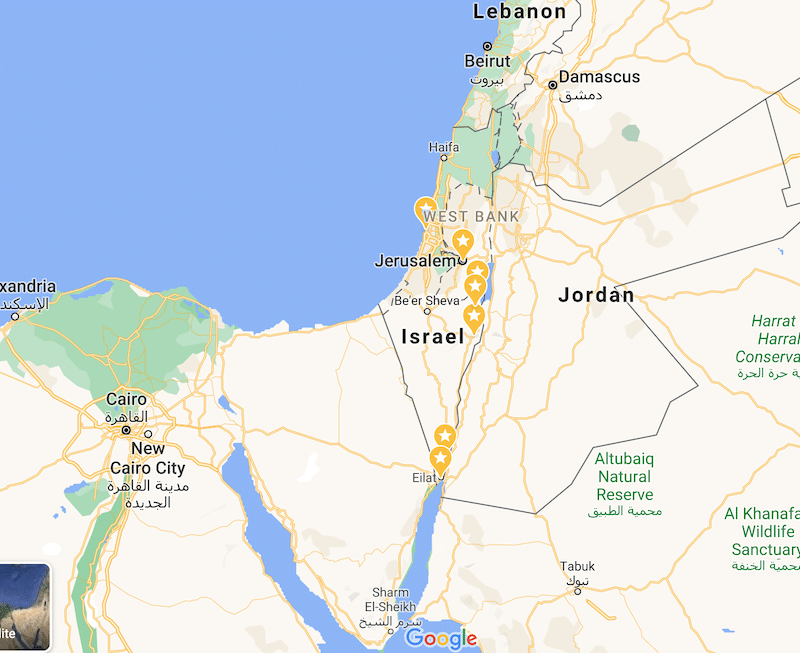
Click here for an interactive Google Map version of the above graphic.
Best Places To Visit In Israel
The following guides share Israel highlights and experiences that you won’t want to miss!
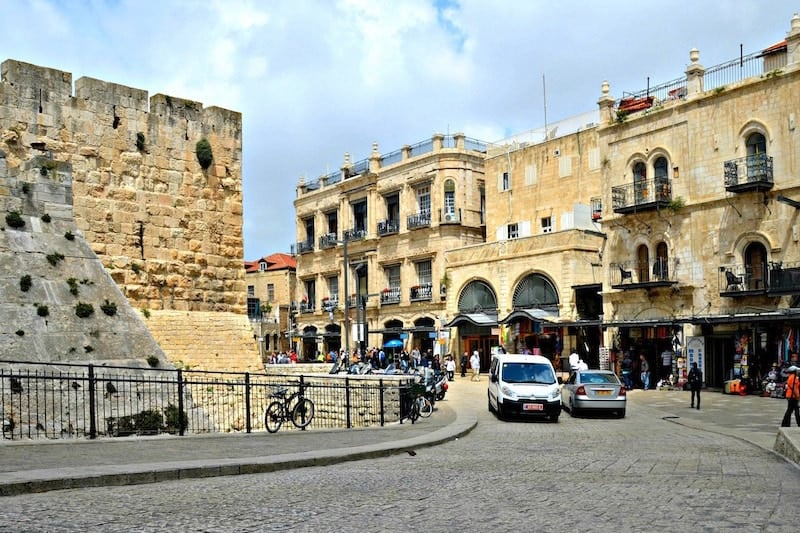
Active Middle East: Amazing Desert Adventures In Israel
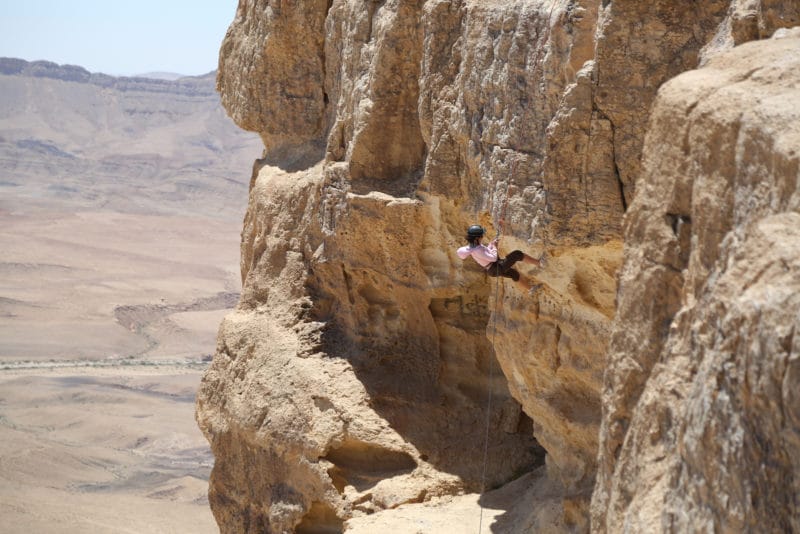
Ramon Crater Adventure: That Time I Hurled Myself Into Israel’s Largest Crater

Israel’s Best-Kept Secret: Eliat’s Treehouse Spa

Awesomely Offbeat Things To Do In Tel Aviv, Israel
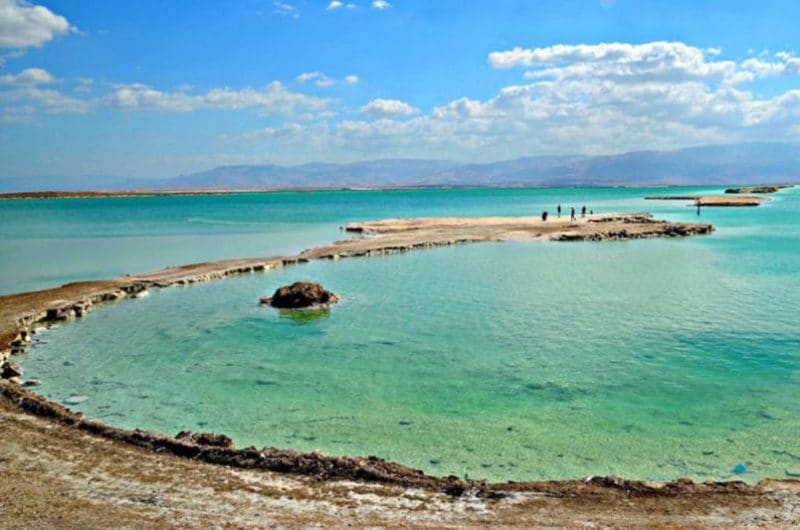
Israel’s Dead Sea Like You’ve Never Seen It Before
Travel Tips For Israel
Plan the perfect trip with these Israel travel tips !

10 Reasons Why Israel Should Be Your Next Trip
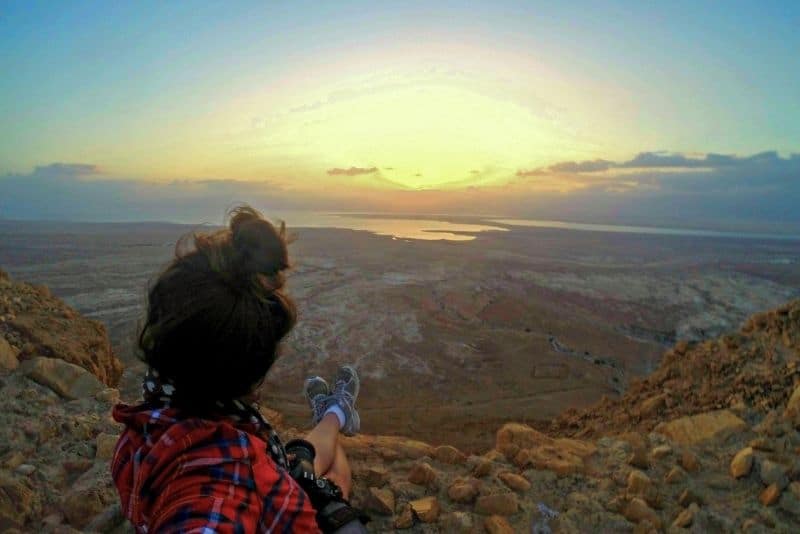
Solo Female Travel In Israel: The Ultimate Guide
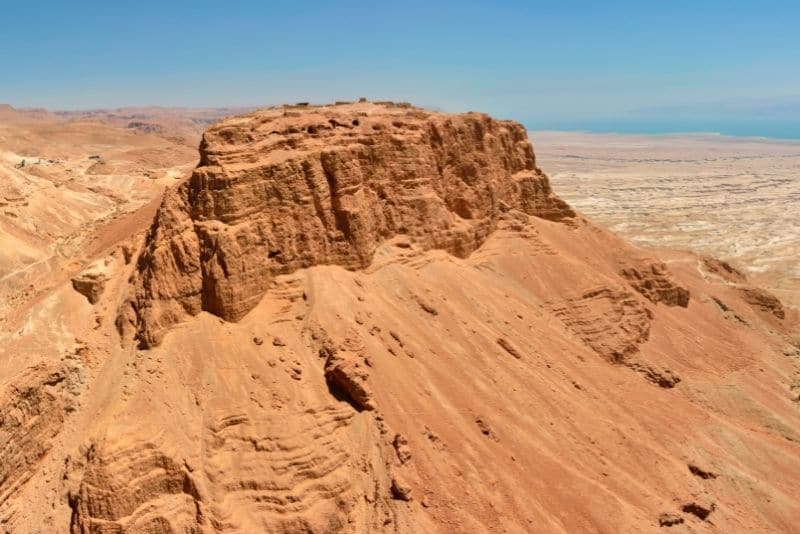
10 Best Hikes In Israel You Shouldn’t Miss (Epic!)
Best Israel Tours
Explore local culture with an Israel tour guide through these unique excursions:
- Hot Air Balloon Flight Including Champagne Gourmet Breakfast and Souvenirs from the Northern District
- Mount Sinai and Saint Catherines Monastery Day Trip from Eilat
- Local Israeli Cooking Class in Tel Aviv
- Tel Aviv Highlights Bike Tour from Ramat Gan
- Timna Park Jeep Tour from Eliat
- Dead Sea, Sunrise at Masada & Ein Gedi Nature Reserve Tour from Tel Aviv
- Golan Heights Day Trip from Tel Aviv
- Desert Jeep Tour: Mar Saba Monastery and Wadi Qelt from Jerusalem
Renting A Car In Israel
Need a rental car for your Israel trip?
Use Discover Cars to quickly compare your car rental options.
Israel Hotels
Click here to browse the best Israel travel hotels!
Prefer self-contained stays?
Click here to check out unique local rentals!
You can also use this map to search for local stays and experiences:
Israel Travel Insurance
It doesn’t matter if you’re traveling solo or with a group on an Israel tour. When visiting Israel — or any other country in the world — make sure to get travel insurance to protect your health and safety.
In my opinion, the best travel medical insurance for travelers is SafetyWing as they’ve got a large network and offer both short-term and long-term coverage — including coverage if you’re traveling for months as well as limited coverage in your home country).
Additionally, SafetyWing is budget-friendly and offers $250,000 worth of coverage with just one low overall deductible of $250.
With coverage, you’ll have peace of mind as you embark on your Israel travel itinerary.
Click my referral link here to price out travel insurance for your trip in just a few clicks .

Israel Travel Guide FAQ
Below, find answers to frequently asked questions about traveling in Israel .
Q: What are the best cities in Israel to visit?
If you have to pick three cities to visit in Israel, make them Tel Aviv, Jerusalem, and Bethlehem.
These three cities will give you a feel for the country’s storied past and cosmopolitan present while offering something for every kind of traveler.
Tel Aviv is a lively beachside metropolis with one of the most exciting cultural scenes in the world. Walk around the trendy neighborhood of Neve Tzedek and check out both small art galleries and major institutions like the Rokach House Museum.
Additionally, learn more about the Jewish Diaspora at Beit Hatfutsot at Tel Aviv University. Wander around the White City, a UNESCO Heritage Site full of cream-colored Bauhaus-style buildings. Or just lounge on the beach and enjoy the Mediterranean sunshine!
Jerusalem is a must-visit for travelers of all faiths. Here, you can visit a truly ancient city and some of the holiest sites in the world.
You’ll find most of Jerusalem’s top attractions in the Old City, a neighborhood that dates back to 1004 B.C. and blends aspects of Jewish, Muslim, Christian, and Armenian cultures.
The Old City contains the Western Wall, the holiest site in the Jewish faith; Temple Mount and the Dome of the Rock, the location of the two Jewish Temples and a significant site in Islam; and the Church of the Holy Sepulchre, a basilica built on what is believed to be the site of Jesus’s tomb.
Beyond the Old City, you can check out the famous Dead Sea Scrolls at the Israel Museum or browse the culinary offerings available at the Mahane Yehuda Market.
Jerusalem is also home to a thriving nightlife scene with chic cocktail bars and galleries to explore.
Moreover, the city of Bethlehem is home to many important religious sites, particularly for Christians as it is believed to be the birthplace of Jesus Christ.
Here, you can visit the Church of the Nativity, built on what is believed to be the site of Jesus’s birth, and the Milk Grotto, where the Holy Family is said to have hidden during the Massacre of the Innocents.
Bethlehem is also a great place to experience and learn more about Palestinian culture.
The Old Bethlehem Museum features a recreation of a 19th-century Palestinian home as well as several other historic artifacts. You can also stop by the Palestinian Heritage Center where you can find handmade clothing, jewelry, and other products from local Palestinian artisans.
Q: What should I know before traveling to Israel?
One of the most important things to keep in mind when planning a trip to Israel is Shabbat, or the Jewish Sabbath.
The weekend consists of Friday and Saturday in Israel as Saturday is the holiest day of the week.
Most businesses and public transit systems shut down from sundown on Friday nights to sundown on Saturday nights to observe Shabbat.
You’ll likely find a few places open here and there (particularly in more secular cities) but this probably won’t be a day for major activities and dining plans.
If you’re in a predominantly Jewish city like Jerusalem, be prepared to take the stairs as many businesses shut down their elevators on Shabbat. If you’re touring the country and want to avoid the effects of Shabbat, this might be a good time to visit a predominantly Christian city like Nazareth or a Muslim city like Acre.
While Hebrew is Israel’s official language, you’ll find that English is widely spoken. About 85% of the country’s population speak at least some English, so you shouldn’t have too much of a problem communicating with locals.
The Israeli people are also known to be quite warm and sociable and greet people with hugs and kisses on the cheek.
They are also very direct communicators and not afraid to share their opinions. If you end up in a lively debate over dinner at your new Israeli friend’s house, don’t be surprised!
It’s also very important to be respectful of the different cultures and religions of Israel. You’ll want to be aware of the dress codes and modesty guidelines for different religious sites before you visit.
Women are asked to cover their knees and shoulders at most places of worship and may be asked to cover their hair at Islamic holy sites. Keep a scarf or shawl handy just in case.
Men are generally required to keep their knees and shoulders covered, as well. These are also good guidelines to keep in mind when visiting more religious neighborhoods and cities.
Q: Is it safe to travel to Israel?
The threat of terrorism is an unfortunate reality that many live with in Israel, the West Bank, and Gaza. It’s important to be aware of these threats and keep an eye on the news while traveling in this region.
That said, Israel is known to be quite safe for travelers due to its low crime rate and emphasis on security. You’ll see this as soon as you cross the border. For instance, you’ll probably face more questions from security officers than “business or pleasure?”.
Security officers are also present throughout Israeli cities, particularly at major religious sites.
And as with any major travel destination, you’ll want to stay vigilant and aware of your surroundings at all times to avoid pickpocketing and petty theft.
If you plan on visiting cities like Bethlehem, Ramallah and Jericho, you’ll need to cross into the West Bank, an area controlled by Palestinian authorities. Security is particularly strict on the Israeli-West Bank border, so it’s important to take the border crossing process seriously and answer any questions from security officers honestly.
It’s best to stick to the major cities and tourist areas when visiting the West Bank, and you may even want to travel with a tour group for added safety and ease.
Due to the increased rates of violence, most governments and travel experts warn travelers against visiting the Gaza Strip.
Q: How much money do I need per day in Israel?
The average traveler spends around $107 USD per day in Israel on accommodations, food, transportation, attractions, and other expenses.
How much you spend per day varies from city to city; Tel Aviv is considered one of the most expensive cities in the world and accommodation prices are rising across the country.
Q: How many days do you need for Israel?
Most experts recommend planning for about 10 days in Israel. This will give you a few days to spend in the major cities as well as time to visit the Dead Sea and other attractions off the beaten path.
Q: What is the best month to visit Israel?
If you’re looking for mild weather, it’s a toss up between the spring months (April and May) and autumn months (September and October), though note Passover in the spring can drive up prices and crowds.
Q: How long can a tourist stay in Israel?
Tourists from many countries — like the United States and Canada — can visit Israel for up to 90 days without a visa.
Q: Do I need an Israel travel visa?
Travelers from the United States, Canada, and several other countries do not need a visa to visit Israel for a period of fewer than 90 days.
It’s recommended to view your country’s Israel International Travel Information page for the most up-to-date information on entry and exit rules and Israel Travel Requirements. You can also contact the Embassy of Israel.
Q: Can you tour Israel on your own?
Yes. You do not need a tour guide to explore Israel, though having one can certainly provide you a deeper understanding of the place.
Q: Where is Israel?
Israel is located in the Middle East. It shares land borders with Lebanon (north), Syria (northeast), Jordan (east), the Palestinian territories of the West Bank and the Gaza Strip (east and west, respectively), and Egypt (southwest).
Q: Are credit cards accepted in Israel?
Credit cards — particularly Visa and Mastercard — are widely accepted around Israel, though it is always wise to carry some cash for smaller establishments and in case of emergency.
Q: Can you drink the tap water in Israel?
The tap water is safe to drink in Israel in most places, though not the Dead Sea. It is always safe to double-check with your hotel, as well.
Q: What is the local currency in Israel?
The local currency in Israel is the New Israel Shekel (NIS).
What would you add to this Israel travel guide?

Enjoyed this ultimate Israel travel guide? Pin it for later!

We’re sorry, this site is currently experiencing technical difficulties. Please try again in a few moments. Exception: request blocked

To learn more about the guidelines about travel to Israel - click here

TOURIST INFORMATION

SITES TO SIGNIFICANCE
Itineraries.
- LATEST INFORMATION AND UPDATES
- ISRAEL GOVERNMENT TOURISM OFFICES
- ISRAEL IN THE MEDIA
- STATISTICS AND RESEARCH

Photographers: Guy Yehieli, Adam Primer, Kfir Boltin, Linnea Andres, Kfir Sivan, Haim Yafim, Dana Fridlander, refael Ben Ari, Itamar Greenberg, Moshik Lindbaum, Ori Ackerman Video Credits: Israeli food channel, National Geographic
- OFFICIAL BROCHURE
- TERMS OF USE
- PRIVACY POLICY
FOR MORE DEALS:
Advertisement
Supported by
Blinken to Meet With Arab Officials in Saudi Arabia About Israel-Gaza War
The U.S. secretary of state plans to raise the issues of hostages held by Hamas, a potential cease-fire, humanitarian aid and a long-term political solution to the Israeli-Palestinian conflict.
- Share full article

By Edward Wong
Reporting from Washington
Secretary of State Antony J. Blinken will travel to Riyadh, Saudi Arabia, on Sunday to speak with top Arab officials and try to figure out possible solutions for the thorniest issues of the Israel-Gaza war, including humanitarian aid, reconstruction and hostages, the State Department said on Saturday.
One of Mr. Blinken’s priorities on Monday and Tuesday will be discussing “ongoing efforts to achieve a cease-fire in Gaza that secures the release of hostages,” a department spokesman, Matthew Miller, said in a statement. He added that Mr. Blinken would underscore his belief that it is Hamas that stands in the way of a cease-fire for the Palestinian people, since the group is not budging on the hostage negotiations.
Saudi Arabia is hosting a three-day meeting of the World Economic Forum, and top Arab officials, including Mr. Blinken’s diplomatic counterparts, are attending. They include senior ministers from Qatar and Egypt, which have been the two Arab mediators in multiple rounds of talks over a potential hostage agreement between Israel and Hamas.
The forum’s website says Mr. Blinken will be in a half-hour public “conversation” starting at 12:45 p.m. on Monday, the final day of the conference.
American officials are pushing for Hamas to release about 40 of the 100 or more hostages it is holding in exchange for the liberation of many more Palestinian prisoners and a six-week cease-fire. U.S. officials say that would be the first step in securing a permanent cease-fire, and Israel supports the proposal. However, Hamas has insisted on a commitment to a permanent cease-fire, and many Arab officials, including in Saudi Arabia, have been calling for the same; those officials say that such a cease-fire should take place immediately.
Mr. Blinken and other top aides of President Biden have also been trying to push for a long-term political solution to the conflict. In their best-case scenario, they envision Saudi Arabia and perhaps a few other Arab nations agreeing to normalize diplomatic relations with Israel. In exchange, Saudi Arabia would receive advanced weapons and security guarantees, including a mutual defense treaty , from the United States, and a commitment for U.S. cooperation on a civilian nuclear program in the kingdom .
For its part, Israel would have to commit to a concrete pathway to the founding of a Palestinian nation, with specific deadlines, U.S. and Saudi officials say.
Before the war started last October, U.S. and Saudi officials were in intense discussions to reach an agreement on the terms of such a proposal. For those negotiators, a big question at the time was what Israel would agree to. Since the war began, the Americans and Saudis have publicly insisted that Israel must agree to the existence of a Palestinian state.
But Israeli leaders and ordinary citizens have become even more resistant to that idea since the Oct. 7 attacks, in which Hamas and allied gunmen killed more than 1,200 people and took about 240 people as hostages. About 100 of the hostages were released last November in a prisoner swap during a weeklong cease-fire. The Israeli military has launched attacks to eradicate Hamas from Gaza, where the health ministry says more than 34,000 Palestinians have been killed.
Mr. Miller also said on Saturday that Mr. Blinken planned to discuss “continued progress on climate change mitigation and the global energy transition” at one of the World Economic Forum events. The secretary also expected to attend a meeting of ministers from nations in the Gulf Cooperation Council, a regional organization, to talk about security coordination.
An Israeli official told The New York Times on Friday that Mr. Blinken planned to visit Israel while in the region.
If Mr. Blinken does go there, the topics he is likely to discuss would no doubt be the same ones on his agenda for Riyadh, including increasing humanitarian aid for the people of Gaza, a potential political solution in the form of a multicountry megadeal and the impasse over a hostage/cease-fire agreement. He would also probably discuss Israel’s plans for a major offensive in the Rafah area of Gaza, which Mr. Biden opposes.
The details of Mr. Blinken’s scheduled trips to the Middle East often change at the last minute . As of Saturday night, the State Department has not announced any stops beyond Riyadh.
Edward Wong is a diplomatic correspondent who has reported for The Times for more than 24 years from New York, Baghdad, Beijing and Washington. He was on a team of Pulitzer Prize finalists for Iraq War coverage. More about Edward Wong
'Uncommitted' organizers will join campus protesters in Michigan over Gaza
- Medium Text
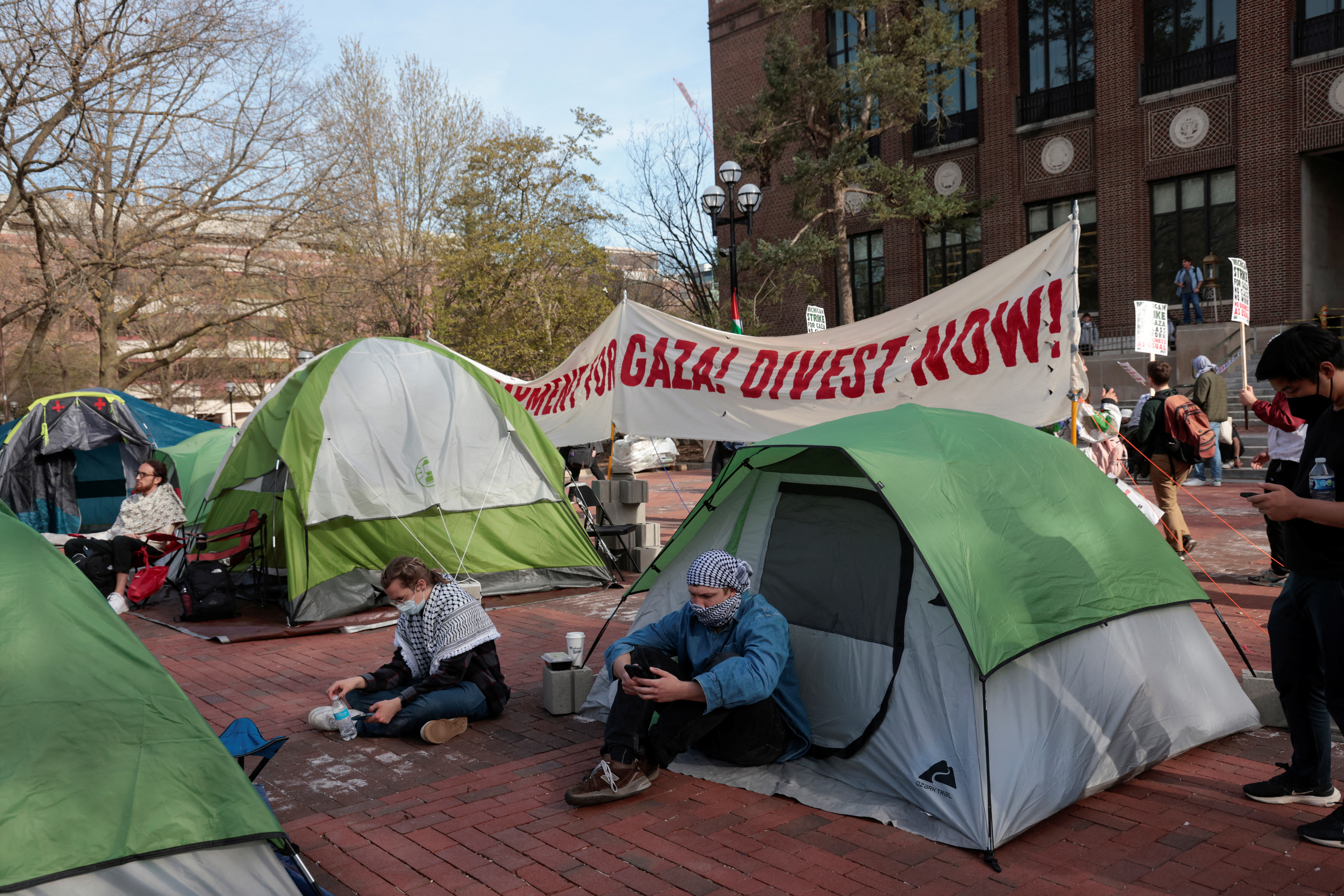
Sign up here.
Reporting by Nandita Bose in Washington; Editing by Heather Timmons and Aurora Ellis
Our Standards: The Thomson Reuters Trust Principles. New Tab , opens new tab

World Chevron
A Russian drone attack heavily damaged a hotel in Ukraine's southern city of Mykolaiv, the governor of the broader Mykolaiv region said, with Russia's RIA news agency reporting the hotel housed English-speaking mercenaries fighting in Ukraine.

Cookies on GOV.UK
We use some essential cookies to make this website work.
We’d like to set additional cookies to understand how you use GOV.UK, remember your settings and improve government services.
We also use cookies set by other sites to help us deliver content from their services.
You have accepted additional cookies. You can change your cookie settings at any time.
You have rejected additional cookies. You can change your cookie settings at any time.
- Business and industry
- Trade and investment
- Embargoes and sanctions
UK and US sanction leading Iranian military figures and entities following the attack on Israel
The UK sanctioned a further 7 individuals and 6 entities that enabled Iran's destabilising activity in the Middle East, including its direct attack on Israel.

Today (Thursday 18 April) the UK has sanctioned a further 7 individuals and 6 entities who have enabled Iran to conduct destabilising regional activity, including its direct attack on Israel.
This adds to the 400 plus sanctions already imposed on Iran. Previous sanctions include the Islamic Revolutionary Guard Corps ( IRGC ) in its entirety and many of those responsible for the attack on Israel.
In a coordinated package with the US, leading Iranian military figures have been sanctioned in response to Iran’s dangerous direct attack on Israel on 14 April. The UK and US have also announced a range of sanctions to tighten the net on key actors within Iran’s unmanned aerial vehicle ( UAV ) and missile industries and further limit Iran’s ability to destabilise the region.
The Foreign Secretary announced these sanctions during his attendance at the G7 Foreign Ministers meeting in Capri, where the UK and our allies reaffirmed support for Israel’s security and the security of all our regional partners.
Prime Minister Rishi Sunak said:
The Iranian regime’s attack against Israel was a reckless act and a dangerous escalation. Today we have sanctioned the ringleaders of the Iranian military and forces responsible for the weekend’s attack. These sanctions – announced with the US – show we unequivocally condemn this behaviour, and they will further limit Iran’s ability to destabilise the region.
Foreign Secretary David Cameron said:
At a time of great tension in the Middle East, Iran’s decision to launch hundreds of drones and missiles towards Israel carried with it a serious risk of thousands of civilian casualties and wider escalation for the region. The sanctions announced today alongside the US demonstrate our unequivocal condemnation of Iran’s attack on a sovereign state. The MSC Aries and its crew should be released immediately, and Iran should halt its reckless and unlawful behaviour. Further escalation is in no one’s interest.
The UK has condemned Iran’s dangerous attack on a sovereign state, which has further inflamed tensions in the Middle East and served to further isolate Iran on the world stage. Today’s designations have been made under the UK’s new Iran sanctions regime , which enables the UK to target Iran’s hostile behaviour.
Further sanctions have been imposed on:
- Armed Forces General Staff: directs and coordinates Iran’s armed forces
- The Islamic Revolutionary Guards Corps ( IRGC ) Navy: 1 of Iran’s 2 naval forces
- The Khatemolanbia Central Headquarters (KCHQ): responsible for operational command and control of Iran’s armed forces
- Major General Gholamali Rashid, Commander KCHQ: responsible for operational command and control of Iran’s armed forces, reports directly to the Supreme Leader
- Brigadier General Mohammad Reza Ashtiani, Minister of Defence Armed Forces Logistics: Iran’s Defence Minister, responsible for supporting and equipping the Iranian armed forces
- Seid Mir Ahmad Nooshin, Aerospace Industries Organisation ( AIO ) Director and 4 further individuals related to AIO
The individuals sanctioned are subject to a travel ban and asset freeze. The entities are subject to an asset freeze.
The IRGC Navy was involved in seizing the civilian ship MSC Aries in international waters and has threatened military action against Israel. The UK has continued to call for the immediate release of the ship and its crew.
In 2023 alone, the UK made 154 new designations. The UK continues to tighten the net on actors involved in the Iranian UAV and missile industries. Last year the UK introduced trade measures prohibiting the export of specific UAV components and services to Iran. The UK has also designated a wide range of companies involved in production of Iranian UAVs, including the Shahed-131 and Shahed-136 drones – models which Iran has supplied to Russia. These types of drones were also used by Iran in its attack on Israel.
The UK is continuing to work closely with our partners in the G7 as we consider further measures to hold Iran’s regime to account.
View the full UK Sanctions List .
The full list of those now subject to UK action today:
- the Khatemolanbia Central Headquarters (KCHQ): responsible for operational command and control of Iran’s armed forces
- the Islamic Revolutionary Guards Corps ( IRGC ) Navy: 1 of Iran’s 2 naval forces
- Seid Mir Ahmad Nooshin: Aerospace Industries Organisation ( AIO ) Director
- Nader Khoon Siavash: AIO Director
- Mohammad Gholami: AIO senior official
- Sayyed Javad Musavi: Commercial director of Shahid Hemmat Industrial Group ( SHIG ), a subsidiary of AIO
- Amir Radfar: Shahid Bagheri Industrial Group ( SBIG ) Director, a subsidiary of AIO
- Mahtabal: involved UAV industry
- Aseman Pishraneh Engineering Services Company: involved in UAV industry
- Sarmad Electronic Sepahan Company: involved in UAV industry
The Aerospace Industries Organisation ( AIO ) is a leading industrial subsidiary of Iran’s Ministry of Defence Armed Forces Logistics with responsibility for missile production. AIO , SBIG and SHIG are already sanctioned by the UK for activity related to Iran’s nuclear programme.
The UK government works with a range of partners and will continue to use all tools at our disposal to protect individuals in the UK against any threats from the Iranian state.
The government continually assesses potential threats in the UK, and takes the protection of individuals’ rights, freedoms, and safety very seriously – wherever those threats may originate.
Today’s sanctions package is being announced under the new Iran (Sanctions) Regulations 2023 , which came into force in December 2023.
The regime contains measures designed to target individuals and organisations, including designation powers designed to deter the government of Iran or armed groups that they back, from conducting hostile activity against the United Kingdom or any other country.
Today’s sanctions on Iranian UAV ’s and ballistic missiles build on our export controls under the Export Control Order 2008, which require any UK exporter wanting to export these items to obtain a licence from the Export Control Joint Unit.
The addition of trade sanctions means that it is also prohibited for UK persons – wherever they are in the world – to facilitate the trade in these items by brokering their sale or supply, or to provide the financial services or funds for the transaction, or to repair the items.
The UK also maintains an arms embargo on Iran, as well as measures targeting ballistic missile production.
Asset freeze
An asset freeze prevents any UK citizen, or any business in the UK, from dealing with any funds or economic resources which are owned, held or controlled by the designated person. It also prevents funds or economic resources being provided to or for the benefit of the designated person. UK financial sanctions apply to all persons within the territory and territorial sea of the UK and to all UK persons, wherever they are in the world.
A travel ban means that the designated person must be refused leave to enter or to remain in the United Kingdom, providing the individual is an excluded person under section 8B of the Immigration Act 1971.
Media enquiries
Email [email protected]
Telephone 020 7008 3100
Contact the FCDO Communication Team via email (monitored 24 hours a day) in the first instance, and we will respond as soon as possible.
Share this page
The following links open in a new tab
- Share on Facebook (opens in new tab)
- Share on Twitter (opens in new tab)
Further notes on this announcement have been added.
First published.
Is this page useful?
- Yes this page is useful
- No this page is not useful
Help us improve GOV.UK
Don’t include personal or financial information like your National Insurance number or credit card details.
To help us improve GOV.UK, we’d like to know more about your visit today. We’ll send you a link to a feedback form. It will take only 2 minutes to fill in. Don’t worry we won’t send you spam or share your email address with anyone.

IMAGES
COMMENTS
As a land of ancient history, diverse cultures, and modern innovation, Israel offers a unique and unforgettable experience for travelers. From the stunning beaches of Tel Aviv to the ancient ruins of Jerusalem, from the breathtaking views of the Negev desert to the sparkling waters of the Sea of Galilee, Israel is a place of endless discovery ...
The Ministry of Tourism operates a virtual office for the benefit of tourists for information and guidance.The Virtual Tourism Bureau is currently undergoing upgrades.For inquiries, please feel free to reach out to us via email at [[email protected]] or by phone at +972-3-7486860]. 08/10/23News.
Plan your trip. The Ministry of Tourism Video Channel. VAT Refund Stores. Tourist Information Office at Ben Gurion Airport. Tourist Information Office in Nazareth. Tourist Information Office in Eilat. Tourist Information Office in Jerusalem. 17/08/23News.
LATEST INFORMATION FOR TOURISTS TO ISRAEL ON THE CORONAVIRUS (COVID-19): Tourists looking to travel to Israel: At the moment, and until further notice, entry to Israel will be refused to non-citizens or non-residents of Israel arriving from anywhere in the world. In exceptional cases, one may apply for approval of the Foreign Ministry subject ...
Out of an abundance of caution over the new Omicron variant of the COVID-19 virus, as of November 28th, 2021, Israel has closed its borders to all tourists until December 13th, 2021. Only citizens of Israel and specific visa holders are allowed entry to Israel. If you had a trip scheduled during that time, even if you or your group had been ...
Israel: the country of your dreams. The perfect intersection of human history, vibrant Middle Eastern culture, sunshine, and parties, and of course, food. And now, you're ready to visit for the first time. Located in the space where Asia, Europe and Africa meet, this small country has a big history, and was once known as the center of the world.
Israel. Middle East. Few places on earth stir up passion the way that Israel does: the breathtaking beauty of its hills and valleys, the eerie stillness of the Dead Sea, the multi-colored canyon of Makhtesh Ramon, and the ancient walls and pathways of Nazareth and Jerusalem. The call of the muezzin and the quiet prayers of Orthodox Jews at the ...
Travel advice and information for Israel can range from safety and security to how to make the most out of visiting a specific neighborhood or even drinking the best coffee. Other travel advice and information such as how to cross between borders, which are the best souvenirs to purchase, luggage storage or the best ways to travel on a budget, can all come in handy when planning and preparing.
Old City of Jerusalem. Characterized by narrow, winding streets and alleyways, this ancient part of the city is filled with shrines and attractions holy to Jews, Christians and Muslims including the Western Wall, Temple Mount and the Church of the Holy Sepulchre. 2. Yad Vashem - The World Holocaust Remembrance Center.
Tel Aviv Tourist Information Office: Tel Aviv Promenade, 46 Herbert Samuel Street. Tel: 03-5166188. Jaffa Clock Tower Tourist Information Center: 2 Marzuk VeAzar St. (near the Clock Tower) Tel Aviv Tourism Info website. Tel Aviv, Israel's Non-Stop City, voted as the world's top gay destination. Isn't it time for you to find out why?
Tourist Israel Tours. Over 300 Israel tours, designed by our team of experts, offering a unique way to explore and experience Israel. Tours to Masada & Dead Sea. Tours to Jerusalem. Tours to Petra & Jordan. Tours to the Galilee. Tours of Tel Aviv. Tourist Israel Tours.
Jerusalem is the most-visited city with 3.5 million tourist arrivals annually as of 2017. One of the oldest cities in the world, it is the proclaimed capital of, and largest city of Israel, if the area and population of Israeli-occupied East Jerusalem are included. It is a holy city to the three major Abrahamic religions - Judaism, Christianity, and Islam - and hosts many historical ...
This service provides information regarding tourist entry to Israel through the various border crossings. A valid passport is required upon arrival in Israel. It is essential to ensure that the passport remains valid throughout the planned duration of stay in Israel until the day of departure. The Director of Border Crossings and the Population ...
U.S. Embassy Jerusalem 14 David Flusser Street Jerusalem 93392 Telephone: + (972) (2) 630-4000 Emergency After-Hours Telephone: + (972) (2) 622-7230 Email: [email protected] Contact the Consular Section of the U.S. Embassy in Jerusalem for information and assistance in Jerusalem, the West Bank, Gaza (including the Erez Crossing), and the Allenby/King Hussein Bridge border crossing between ...
When visiting Israel — or any other country in the world — make sure to get travel insurance to protect your health and safety. In my opinion, the best travel medical insurance for travelers is SafetyWing as they've got a large network and offer both short-term and long-term coverage — including coverage if you're traveling for months ...
5) Some "Rites of Passage" - Must-Do's in Israel. Relax and kick back as the Jewish day of rest descends with the Friday sunset. Enjoy the peaceful atmosphere of an Israeli Shabbat, including a lavish dinner. Experience the urban vibe of the iconic "White City" by joining our Tel Aviv and Jaffa Walking Tour.
Travel Israel. From £698. Jerusalem City Break: 4-night r/o staying at YMCA 3 Arches Hotel inc. BA flights from Heathrow, base. BOOK NOW > easyJet Holidays. ... The Internet is now the largest repository for freedom of information for all users. And users with disabilities in particular. We place great importance on providing an equal ...
The service is provided through the below four digital platforms: Email: [email protected]. Whatsapp: +972-55-9726931. Facebook: Israel Virtual Tourist Office Facebook page. All platforms are also available in English. The variety of contemporary digital platforms allows travelers to enjoy a perfect vacation in Israel easily.
Alerts and Messages. Level 3: RECONSIDER TRAVEL - Israel, the West Bank and Gaza Travel Advisory. Read More. Updated with information on travel restrictions for U.S. government employees under Chief of Mission security responsibility. Read More.
Israel Tourism Consultants. $1,378. Register for your Holy Land Tour to Israel with a deposit of $200 dollars only. book now. SUNNY LAND TOURS, INC. $1,599. Save $200 on the Israel Peace & Olives - 8 day tour. book now. Israel Tourism Consultants. $1,759. Save up to $1050 per couple on our popular In the Footsteps of Christ Tour.
Secretary of State Antony J. Blinken will travel to Riyadh, Saudi Arabia, on Sunday to speak with top Arab officials and try to figure out possible solutions for the thorniest issues of the Israel ...
Whilst it only takes six hours to drive from north to south, and, in places, 20 minutes from east to west, Israel is a fantastic travel destination with great diversity developing an international reputation as a cool tourist destination. From visiting the holy city of Jerusalem, holy to Jews, Christians and Muslims, to visiting the cool ...
Organizers behind the "uncommitted" political movement against President Joe Biden's staunch support for Israel's war against Hamas will travel to the University of Michigan's campus on Thursday ...
Getting online is not a problem in Israel. Language - Hebrew and Arabic are official; English is widely spoken, as, to lesser degrees are Russian and French. Maps - Road maps are widely available, many in English. Google Maps has a great coverage of Israel, whilst Israeli app Waze offers real-time travel information and GPS for free.
The Iranian regime's attack against Israel was a reckless act and a dangerous escalation. Today we have sanctioned the ringleaders of the Iranian military and forces responsible for the weekend ...
Tel Aviv is one of the most vibrant cities in the world. Titled the 'Mediterranean Capital of Cool' by the New York Times, this is a 24 hour city with a unique pulse, combining sandy Mediterranean beaches with a world-class nightlife, a buzzing cultural scene, incredible food, UNESCO recognized architecture, and an international outlook.